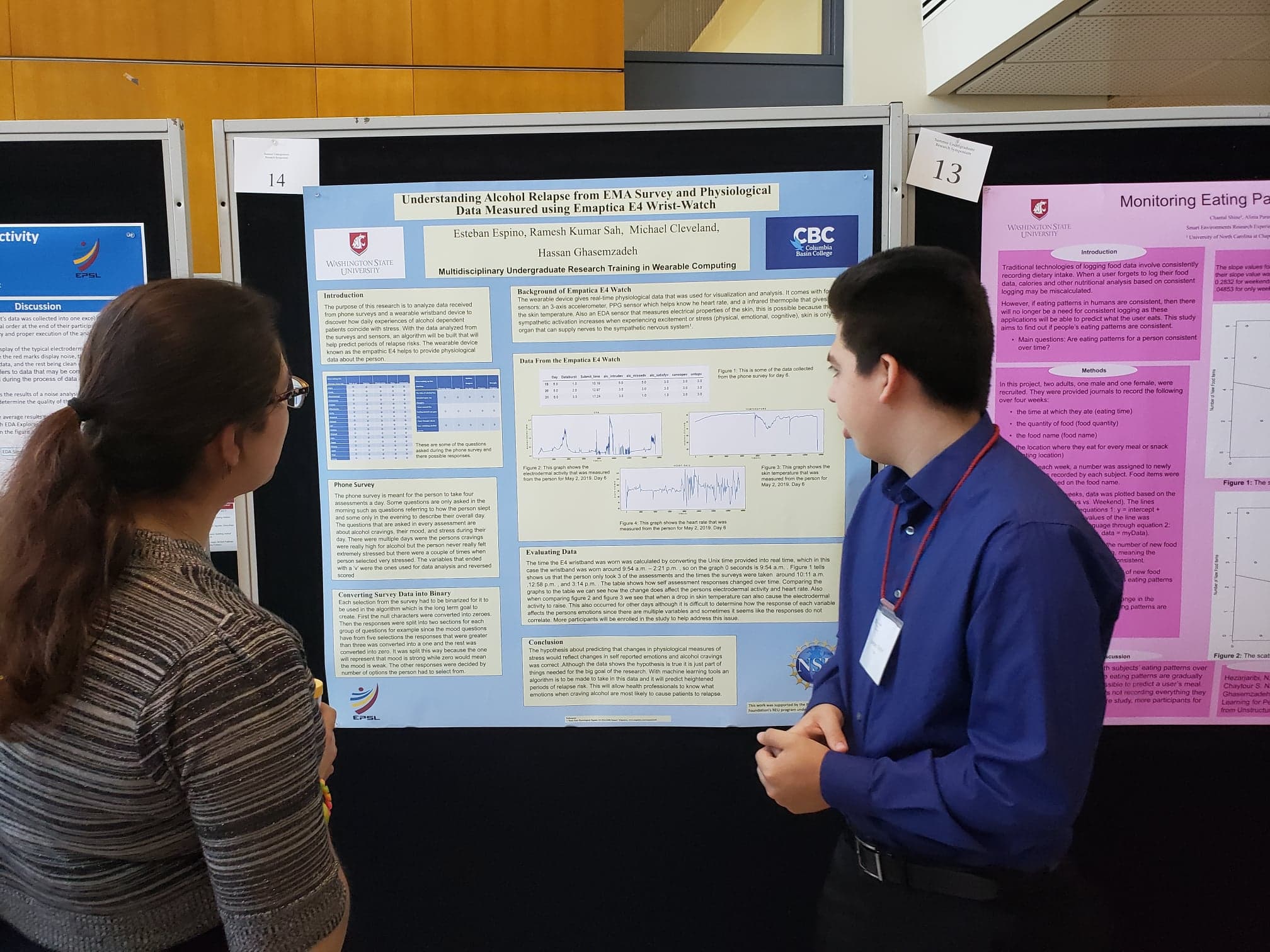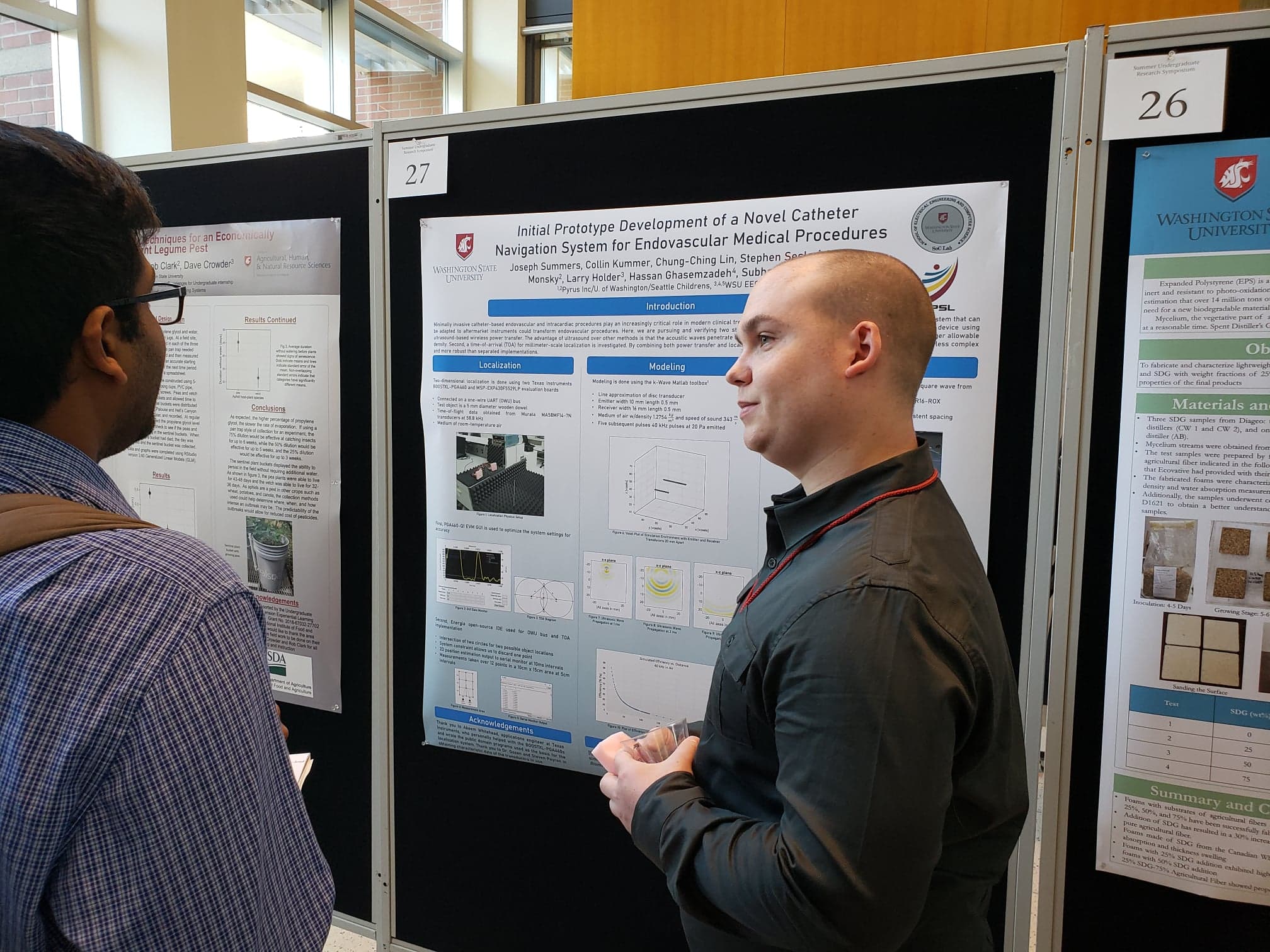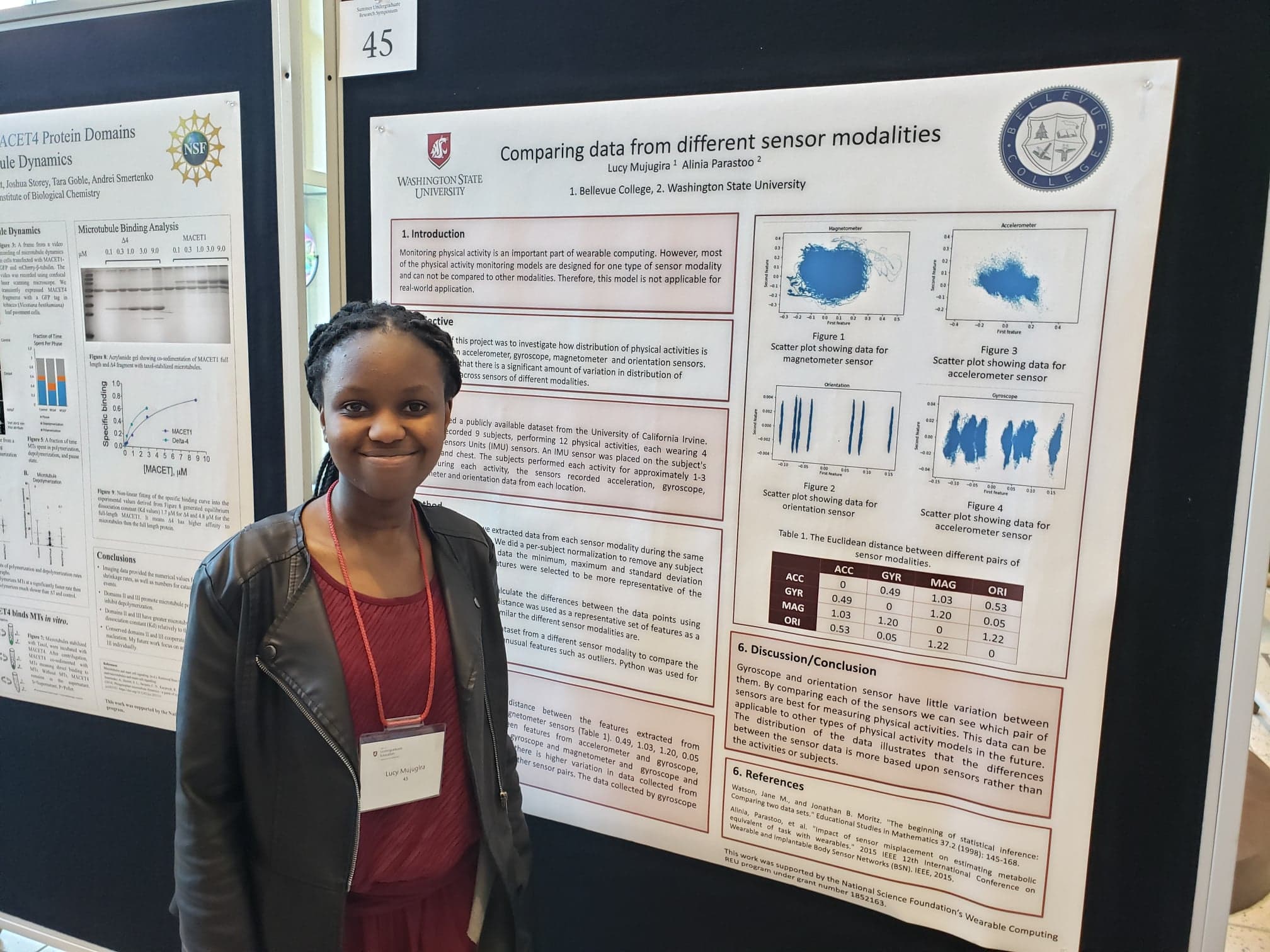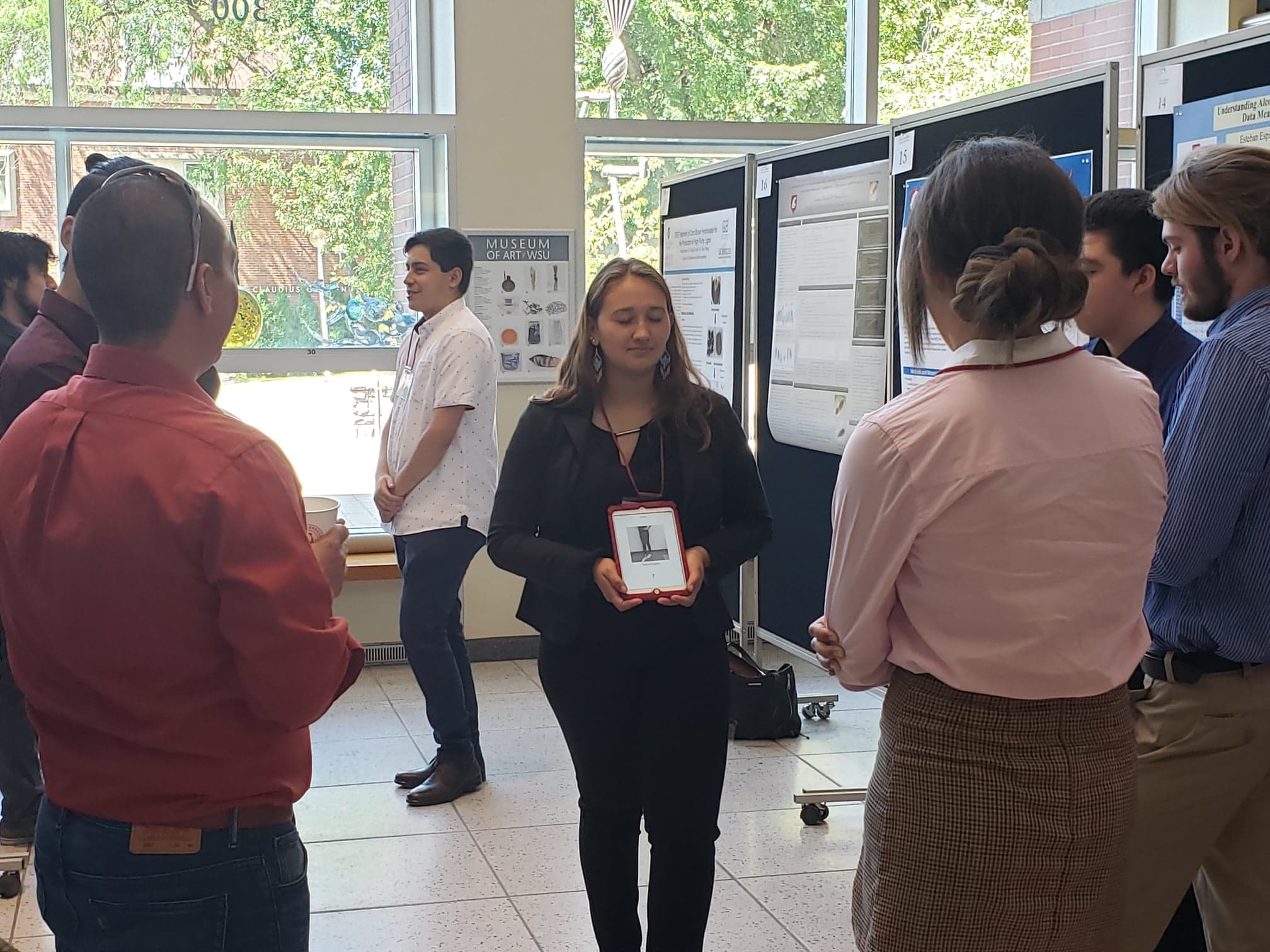Multidisciplinary Undergraduate Research Training in Wearable Computing
Program Overview
The objective of the REU program is to provide unique training, research, and education opportunities for undergraduates in the area of technology-driven healthcare systems, particularly for underserved communities. The REU participants will have chances to explore multidisciplinary topics in pervasive computing, machine learning, data mining, circuits, and system design as applied to healthcare, population health, and health sciences. Leveraging the community of scholars promoted by the Washington State University (WSU) Office of Undergraduate Research, REU students will have ample opportunities for extracurricular, social, and group activities. The participants will experience working with and learning from faculty, postdocs, and students with different but complementary technical backgrounds and cultures, e.g., computer scientists working with health scientists and vice versa. Both theoretical and practical (hands-on) research will be emphasized.
Research Projects:
Few examples of the projects in which the students could be involved are:
- Physical Health Monitoring
- Improving medication adherence in patients with chronic conditions.
- In-home balance control assessment and tracking for pregnant women
- Mental Health Monitoring
- Continuous and real-time personality assessment
- Understanding processes of recovery from addiction and preventing relapse in real-time
- Transformable Architectural Spaces for Health Promotion
- Emotion recognition with wearable sensors
- Designing mixed-modality user interfaces
REU students are mentored by Dr. Hassan Ghasemzadeh, Associate Professor and Director of Embedded Machine Intelligence Lab at Arizona State University, and Dr. Mona Ghandi, Assistant Professor and Director of Morphogenesis Lab at Washington State University. In addition to conducting cutting-edge research, students will also have the benefit of participating in weekly technical team meetings and seminar series and working in an interdisciplinary and multicultural team with hands-on research projects. Below we list participants of past REU programs and their projects.
2022
Emotion Recognition using Wearables
- Jared Kelnhofer, Walla Walla Community College, WA
- Mentors: Mona Ghandi
Realtime Stress Detection and Classification on a Smartphone
- Richard Castro, Washington State University, WA
- Mentors: Hassan Ghasemzadeh, Ramesh Kumar Sah
2021
Emotion Prediction from EEG Data using Convolutional Neural Network vs LSTM for Signal Processing
- Jared Kelnhofer, Walla Walla Community College, WA
- Mentors: Mona Ghandi, Marcus Blaisdell
Examining if a Neural Network can Outperform a Decision Tree Algorithm on Biometric Data for Emotion Prediction
- Ahmed Abdelgali, Villanova University College of Engineering, VA
- Mentors: Mona Ghandi, Marcus Blaisdell
Comparing the Predictability of Sensor Modalities to Detect Stress from Wearable Sensor Data
- Ryan Holder, Pullman High School, WA
- Mentors: Hassan Ghasemzadeh, Ramesh Kumar Sah
Analysis of Wearable Sensor Data for Stress Monitoring
- Yimei Chen, Cornell University
- Mentors: Hassan Ghasemzadeh, Ramesh Kumar Sah
Development of User-Friendly Object Detection Method for Video Labelling
- Grace Stewart, University of Maryland - College Park
- Mentors: Robert Catena, Abdullah Al Mamun
2020
Improving Predicting Human Emotions with EEG by application of Fast-Fourier Transform
- Joshua T. Okamoto, University of California, Berkeley
- Mentors: Mona Ghandi, Marcus Blaisdell
Comparison of Machine Learning methods for Emotion Prediction from Biometric Data
- Zakiya Pruitt, Columbia Basin College, WA
- Mentors: Mona Ghandi, Marcus Blaisdell
Emotion Prediction with Unsupervised Learning from Biometric Data and Exploration of the Psychology of Emotion Data Collection
- Sena Atay, University of North Carolina at Chapel Hill
- Mentors: Mona Ghandi, Marcus Blaisdell
Biometric Data Segmentation for Classifying Stressed and Unstressed Signal Regions to Predict Alcohol Relapse
- Dainel Faronbi, University of Nebraska Omaha/Lincoln
- Mentors: Hassan Ghasemzadeh, Michael J. Cleveland, Ramesh Kumar Sah
Adversaraial Attacks on Deep Models for Audio Data
- Tyler Cleveland, Washington State University, WA
- Mentors: Jana Doppa
2019
Predicting Human Emotions with EEG
- Alex Trevithick, Williams College, MA
- Mentors: Mona Ghandi, Salikh Bagaveyev, Marcus Blaisdell
Crafting Caring Spaces
- Reece Keller, Highline College, WA
- Mentors: Mona Ghandi, Marcus Blaisdell, Salikh Bagaveyev
Ecological Momentary Assessment Mobile App for Real-time Behavioral Measures
- Karla Bustamante-Zamora, Highline College, WA
- Mentor: Porismita Borah
Development of At-Home Balance Control Assessment and Tracking Smartphone App for Pregnant Women
- Va Diep, Bellevue College, WA
- Mentors: Robert Catana
Survey Data and Empatica E4 Wristwatch Help Show How Physiological Markers of Stress: Affect Alcohol Dependent Patients
- Esteban Espino, Columbia Basin College, WA
- Mentor: Michael Cleveland, Ramesh Kumar Sah
Liquid Intake Detection System
- Sean Henry Luchessa, Washington State University, WA
- Mentors: Hassan Ghasemzadeh, Mahdi Pedram
Comparing Data from Different Sensor Modalities
- Lucy Mujugira, Bellevue College, WA
- Mentors: Hassan Ghasemzadeh, Parastoo Alinia
Initial Prototype Development of a Novel Catheter Navigation System for Endovascular Medical Procedures
- Joesph Summers, Washington State University, WA
- Mentor: Subhanshu Gupta
2018
Predicting Emotion Based on Biological Signal Inputs using Machine Learning
- Lucia Martisovitsova, University of California, Berkeley
- Mentors: Mona Ghandi, Salikh Bagaveyev
2017
Developing Power Models for Smartwatches to Improve Battery Lifetime during Long-Term Data Collection
- Nathan Seitz, University of Illinois at Chicago, IL
- Mentors: Hassan Ghasemzadeh, Ramin Fallahzadeh
2015
Developing a Tool for Time-Series Signal Annotation
- Ellen Louie, George Washington University, DC
- Mentors: Hassan Ghasemzadeh and Ramin Fallahzadeh
Infrastructure Development for Data Collection and Analysis with a Smartwatch
- Deontae Pharr, Kennesaw State University, GA
- Mentors: Hassan Ghasemzadeh, Ramin Fallahzadeh



